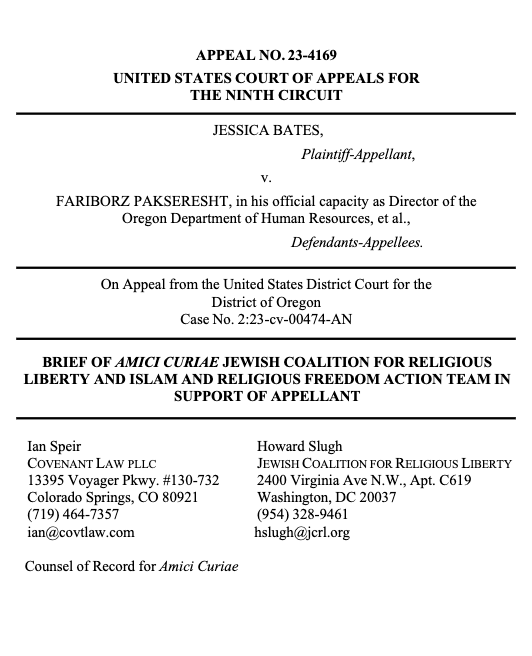Summary of facts: An Oregon policy requires adoptive parents to “accept” and “support” a child’s “sexual orientation” and “gender identity,” which includes committing to using a child’s chosen pronouns, taking a child to gay-pride parades, and refraining from expressing contrary views. The plaintiff in this case wants to adopt children, but the state rejected her because she will not speak or act in ways that violate her religious beliefs about human sexuality. The plaintiff filed a lawsuit and a motion for preliminary injunction in federal district court, arguing that Oregon’s policy violates her First Amendment rights to free speech and free exercise of religion. The court denied her motion on the ground that a child she adopts might someday identify as “LGBT” and that exposure to her religious beliefs might upset such a child. The state’s interest in avoiding this harm, the court held, outweighs any constitutional rights the plaintiff might have. The plaintiff appealed to the U.S. Court of Appeals for the Ninth Circuit.
RFI’s position: Oregon’s policy bars parents from adopting if they cannot affirm certain ideas about “sexual orientation” and “gender identity.” This will disqualify many potentially ideal Jewish and Muslim candidates who maintain traditional views on sex, gender, and marriage. Hence, Jews and Muslims who hold traditional religious beliefs cannot be certified to adopt, which in turn means that children with traditional religious backgrounds either will not be adopted or will be placed in homes where it will be exceedingly difficult or impossible to maintain their religious heritage. This violates these prospective parents’ rights under the Free Exercise Clause. It is also a terrible policy because it harms religiously observant children who wish to be placed in the homes of religiously observant families, and because it undermines the interest of Jewish and Muslim communities in maintaining the integrity of their communities.
Read the amicus brief here.
THE RFI BLOG

Is Egypt’s Government Trying To Take Over Christianity’s Most Important Monastery?

Does Southeast Asia Lead the World in Human Flourishing?

RFI Leads Training Session on Religious Freedom Law and Policy for U.S. Army War College

Oral Argument in Charter School Case Highlights Unconstitutional Motives Behind OK Attorney General’s Establishment Clause Claim

Largest Longitudinal Study of Human Flourishing Ever Shows Religion’s Importance
CORNERSTONE FORUM

Reaffirming Religious Freedom: Bridging U.S. Advocacy and Iraq’s Constitutional Framework

Political Polarization, Same-Sex Marriage and Religious Liberty

Bridging the Gap Between International Efforts and Local Realities: Advancing Religious Freedom in the MENA Region

Challenges to Religious Freedom in Iraq and the Critical Need for Action


